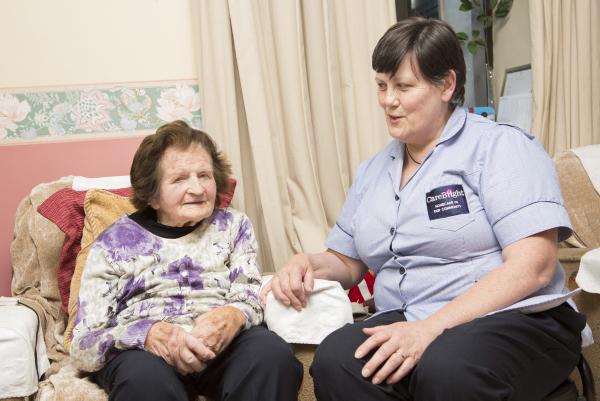What do two hours mean to you? It’s an insignificant amount of time for some, but to the Allen family it’s the difference between having a social life, running a business and enjoying a good quality of life.
Carer Marian O’Flynn spends two hours per day in their home in Knocklong, Limerick, helping to mind Bridget Allen who recently turned 100. She assists with Bridget’s personal care while Frank, who is Bridget’s son, tends to the farm and his wife Ann runs her business.
“We’d be totally lost without Marian,” says Ann. “Because of her, Bridget can stay at home and I can continue with my work.”
The Allens are one family that are availing of CareBright’s services. From its establishment in Ballyhoura in 1998, the organisation, which was known as RCCN Caring until earlier this year, has grown from 10 carers to over 220 and serves 400 clients across Limerick, north Tipperary, north Kerry and north Cork. The majority of its clients are from rural areas.
CareBright was launched by a group from Ballyhoura Development, with the intention of providing a homecare system for the elderly and people with disabilities that would allow women to work outside the home. Since 2006, the group provides care on behalf of the HSE and its carers, many of whom are from farms and are all trained to liaise with public health nurses.
As a not-for-profit organisation, CareBright strives to provide an affordable care plan, which is determined through a consultation in the home. The group also provides palliative and respite care and chiropody services.
Care manager Noreen Kennedy tells Irish Country Living how a few hours of help per day can make a big difference to a family’s wellbeing.
||PIC2||
“Some people don’t require a lot of help, but some homes cannot manage without it,” she says. “Even getting someone out of bed and making breakfast can be hugely difficult to achieve in a working family when people are going to work or school.
“That hour of care per day enables people to live safely in their own home. Our system is working and it shows that families want to keep their elderly at home.”
Despite cuts in respite care and carer’s allowance by the government, Noreen believes that the role of the carer is well-respected by the public.
“I think carers are hugely respected and are very important in rural areas,” she says. “People can’t afford nursing homes and would generally prefer to have their family member live with them. A home is usually the last resort for a lot of families. Most of them don’t need qualified nurses – they just need someone to help them.”
||PIC3||
For Ann and Frank, CareBright has given their family a lifeline.
“Marian manages to do the jobs I can never do. She is a very important part of Bridget’s daily routine,” says Ann.
“She makes her tea and food and has everything done by the time I return home at half four after the school bus run,” she continues. “We are able to work around Marian’s schedule, so if I’m not here, Frank is.”
Ann and Frank minded Bridget for 10 years without help from a carer, but once her three daughters started to leave home it became more difficult.
“One of my daughters, Helena, used to have to call over after work and help in the evenings,” says Ann. “I also run a rural transport business and was very tired, but I didn’t want Bridget to go into a home. I couldn’t leave her there for days on end.
“It’s not feasible for all families, but I believe you should try to keep the elderly at home for as long as possible.”
Life changed when Bridget’s public health nurse told Ann about CareBright and Marian started work in the home a few years ago.
“I’m able to continue on with my work because of Marian. I would have had no choice but to leave if she didn’t come along,” says Ann. “We wouldn’t be able to manage without her.”
• If you are considering care or support for a family member, please contact CareBright by phone on 1800 303412 or email info@CareBright.ie. You can also visit one of their offices in Newcastlewest, Charleville or Hospital. CL






 This is a subscriber-only article
This is a subscriber-only article












SHARING OPTIONS: